VW Emission Scandal: Ethical Implications, ICT Profession, and Ethics
VerifiedAdded on 2023/01/16
|7
|1371
|25
Report
AI Summary
This report provides an analysis of the Volkswagen emission scandal, focusing on the ethical breaches and the role of the ICT profession. The incident involved the use of software to manipulate emission test results, leading to significant ethical concerns regarding honesty, competence, and the public interest. The report examines the specific ICT professionals involved in designing and testing the car's emission systems and the implications of their actions. The report also applies the ACS Code of Ethics to the situation, evaluating the scandal in terms of the primacy of public interest, honesty, competence, professional development, and professionalism. It highlights the importance of ethical conduct within the ICT field and the consequences of failing to adhere to professional standards. The report concludes by emphasizing the responsibility of ICT professionals to act ethically and uphold the trust of the public. The report references various sources to support the analysis of the ethical issues and the impact of the scandal.
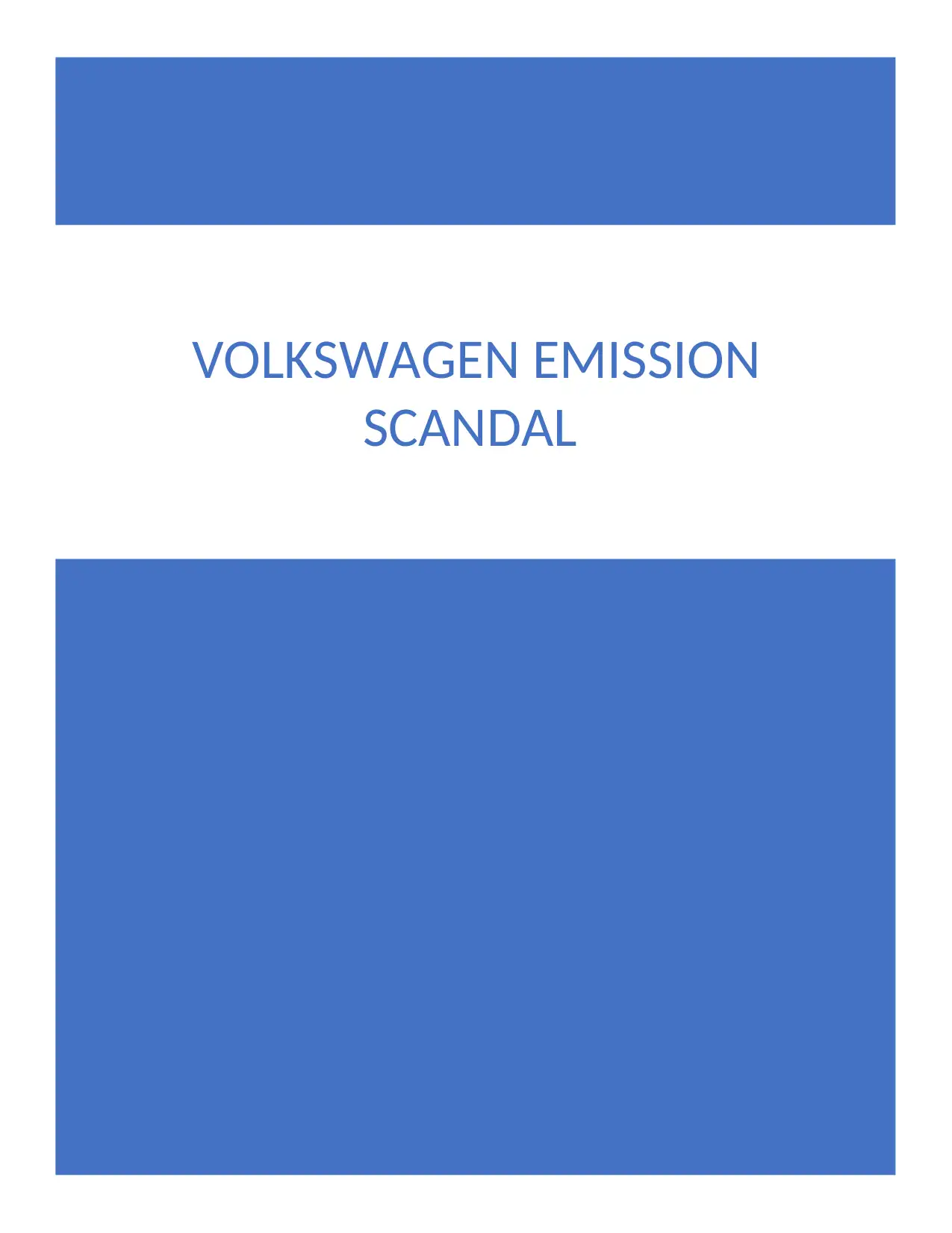
VOLKSWAGEN EMISSION
SCANDAL
SCANDAL
Paraphrase This Document
Need a fresh take? Get an instant paraphrase of this document with our AI Paraphraser
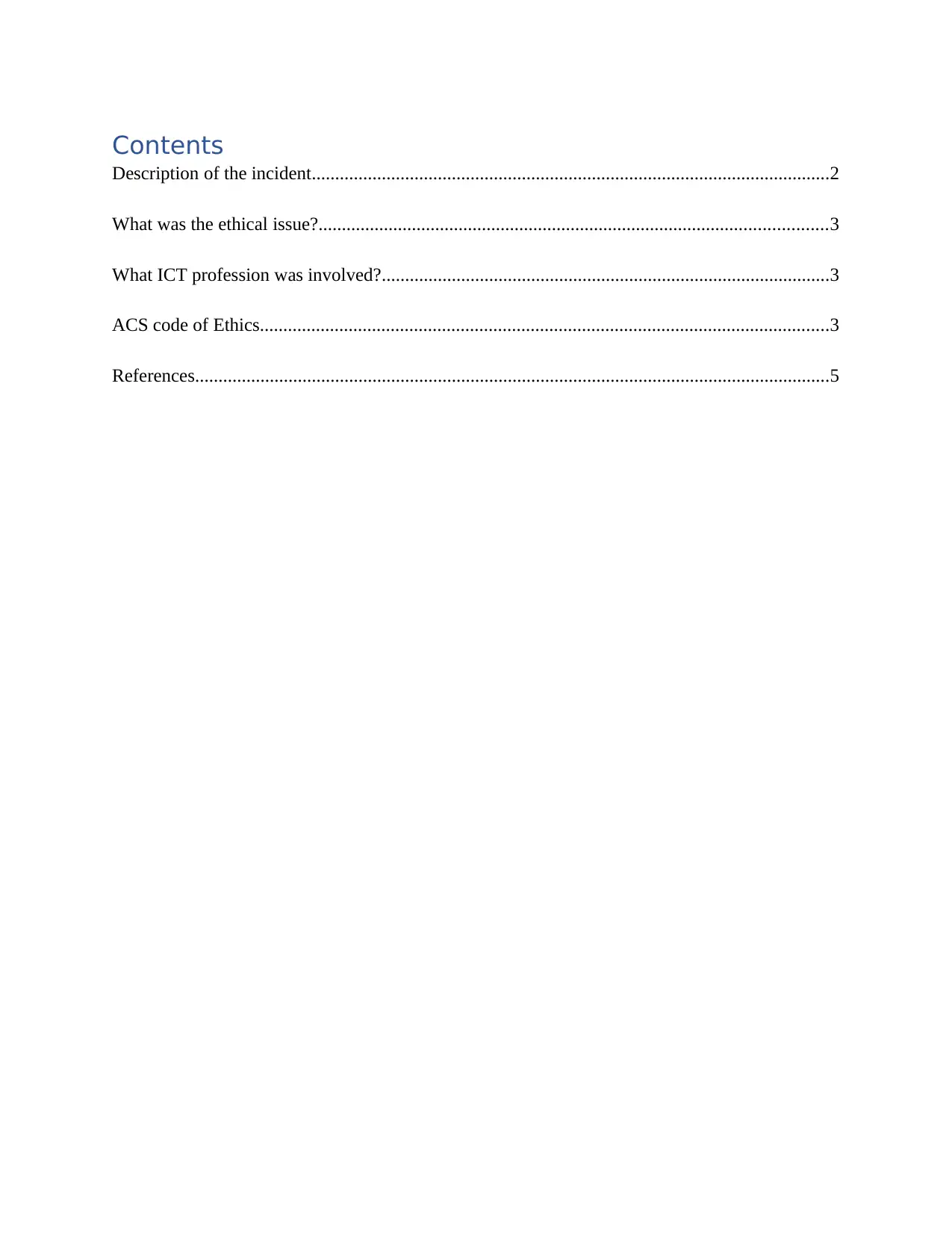
Contents
Description of the incident...............................................................................................................2
What was the ethical issue?.............................................................................................................3
What ICT profession was involved?................................................................................................3
ACS code of Ethics..........................................................................................................................3
References........................................................................................................................................5
Description of the incident...............................................................................................................2
What was the ethical issue?.............................................................................................................3
What ICT profession was involved?................................................................................................3
ACS code of Ethics..........................................................................................................................3
References........................................................................................................................................5
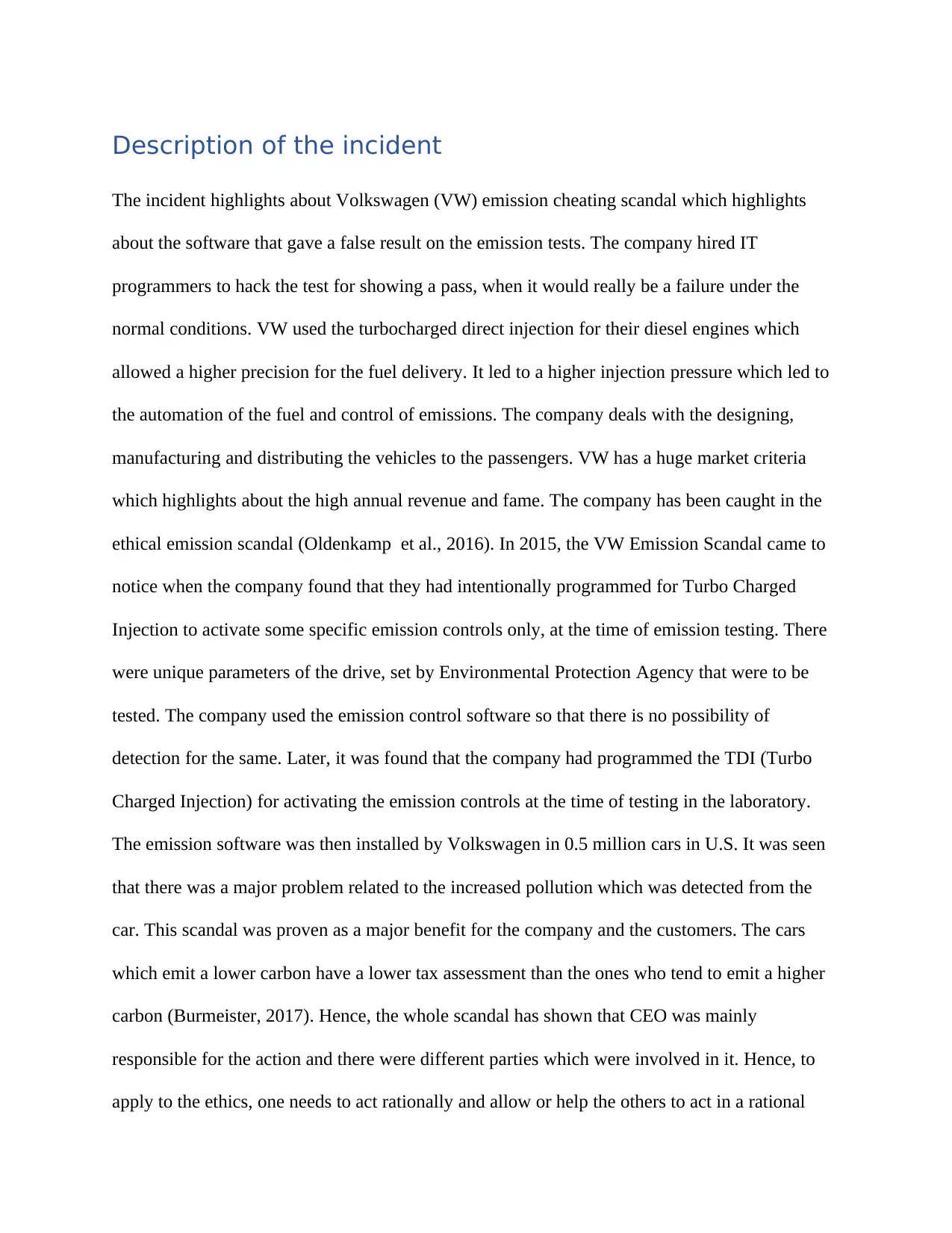
Description of the incident
The incident highlights about Volkswagen (VW) emission cheating scandal which highlights
about the software that gave a false result on the emission tests. The company hired IT
programmers to hack the test for showing a pass, when it would really be a failure under the
normal conditions. VW used the turbocharged direct injection for their diesel engines which
allowed a higher precision for the fuel delivery. It led to a higher injection pressure which led to
the automation of the fuel and control of emissions. The company deals with the designing,
manufacturing and distributing the vehicles to the passengers. VW has a huge market criteria
which highlights about the high annual revenue and fame. The company has been caught in the
ethical emission scandal (Oldenkamp et al., 2016). In 2015, the VW Emission Scandal came to
notice when the company found that they had intentionally programmed for Turbo Charged
Injection to activate some specific emission controls only, at the time of emission testing. There
were unique parameters of the drive, set by Environmental Protection Agency that were to be
tested. The company used the emission control software so that there is no possibility of
detection for the same. Later, it was found that the company had programmed the TDI (Turbo
Charged Injection) for activating the emission controls at the time of testing in the laboratory.
The emission software was then installed by Volkswagen in 0.5 million cars in U.S. It was seen
that there was a major problem related to the increased pollution which was detected from the
car. This scandal was proven as a major benefit for the company and the customers. The cars
which emit a lower carbon have a lower tax assessment than the ones who tend to emit a higher
carbon (Burmeister, 2017). Hence, the whole scandal has shown that CEO was mainly
responsible for the action and there were different parties which were involved in it. Hence, to
apply to the ethics, one needs to act rationally and allow or help the others to act in a rational
The incident highlights about Volkswagen (VW) emission cheating scandal which highlights
about the software that gave a false result on the emission tests. The company hired IT
programmers to hack the test for showing a pass, when it would really be a failure under the
normal conditions. VW used the turbocharged direct injection for their diesel engines which
allowed a higher precision for the fuel delivery. It led to a higher injection pressure which led to
the automation of the fuel and control of emissions. The company deals with the designing,
manufacturing and distributing the vehicles to the passengers. VW has a huge market criteria
which highlights about the high annual revenue and fame. The company has been caught in the
ethical emission scandal (Oldenkamp et al., 2016). In 2015, the VW Emission Scandal came to
notice when the company found that they had intentionally programmed for Turbo Charged
Injection to activate some specific emission controls only, at the time of emission testing. There
were unique parameters of the drive, set by Environmental Protection Agency that were to be
tested. The company used the emission control software so that there is no possibility of
detection for the same. Later, it was found that the company had programmed the TDI (Turbo
Charged Injection) for activating the emission controls at the time of testing in the laboratory.
The emission software was then installed by Volkswagen in 0.5 million cars in U.S. It was seen
that there was a major problem related to the increased pollution which was detected from the
car. This scandal was proven as a major benefit for the company and the customers. The cars
which emit a lower carbon have a lower tax assessment than the ones who tend to emit a higher
carbon (Burmeister, 2017). Hence, the whole scandal has shown that CEO was mainly
responsible for the action and there were different parties which were involved in it. Hence, to
apply to the ethics, one needs to act rationally and allow or help the others to act in a rational
You're viewing a preview
Unlock full access by subscribing today!
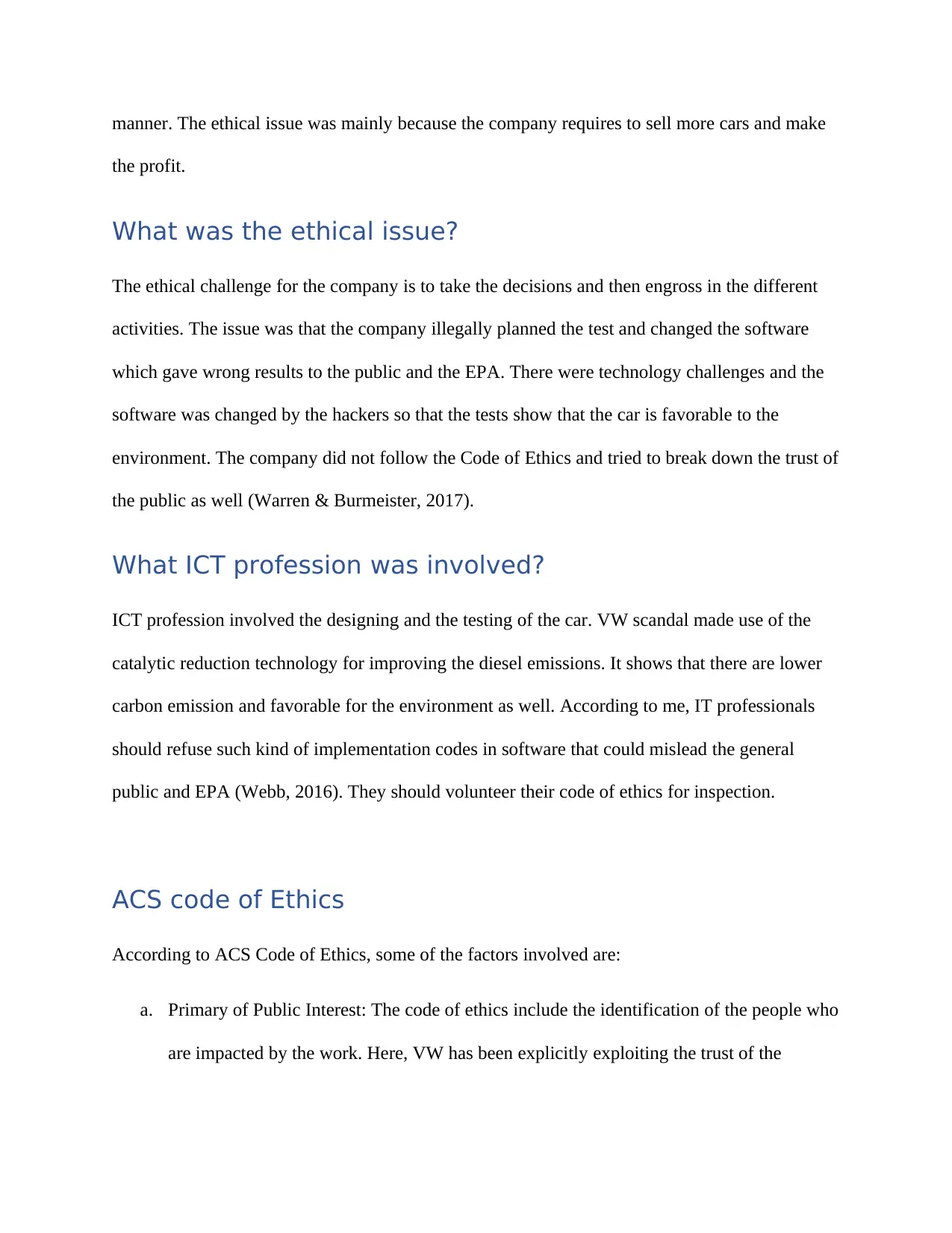
manner. The ethical issue was mainly because the company requires to sell more cars and make
the profit.
What was the ethical issue?
The ethical challenge for the company is to take the decisions and then engross in the different
activities. The issue was that the company illegally planned the test and changed the software
which gave wrong results to the public and the EPA. There were technology challenges and the
software was changed by the hackers so that the tests show that the car is favorable to the
environment. The company did not follow the Code of Ethics and tried to break down the trust of
the public as well (Warren & Burmeister, 2017).
What ICT profession was involved?
ICT profession involved the designing and the testing of the car. VW scandal made use of the
catalytic reduction technology for improving the diesel emissions. It shows that there are lower
carbon emission and favorable for the environment as well. According to me, IT professionals
should refuse such kind of implementation codes in software that could mislead the general
public and EPA (Webb, 2016). They should volunteer their code of ethics for inspection.
ACS code of Ethics
According to ACS Code of Ethics, some of the factors involved are:
a. Primary of Public Interest: The code of ethics include the identification of the people who
are impacted by the work. Here, VW has been explicitly exploiting the trust of the
the profit.
What was the ethical issue?
The ethical challenge for the company is to take the decisions and then engross in the different
activities. The issue was that the company illegally planned the test and changed the software
which gave wrong results to the public and the EPA. There were technology challenges and the
software was changed by the hackers so that the tests show that the car is favorable to the
environment. The company did not follow the Code of Ethics and tried to break down the trust of
the public as well (Warren & Burmeister, 2017).
What ICT profession was involved?
ICT profession involved the designing and the testing of the car. VW scandal made use of the
catalytic reduction technology for improving the diesel emissions. It shows that there are lower
carbon emission and favorable for the environment as well. According to me, IT professionals
should refuse such kind of implementation codes in software that could mislead the general
public and EPA (Webb, 2016). They should volunteer their code of ethics for inspection.
ACS code of Ethics
According to ACS Code of Ethics, some of the factors involved are:
a. Primary of Public Interest: The code of ethics include the identification of the people who
are impacted by the work. Here, VW has been explicitly exploiting the trust of the
Paraphrase This Document
Need a fresh take? Get an instant paraphrase of this document with our AI Paraphraser
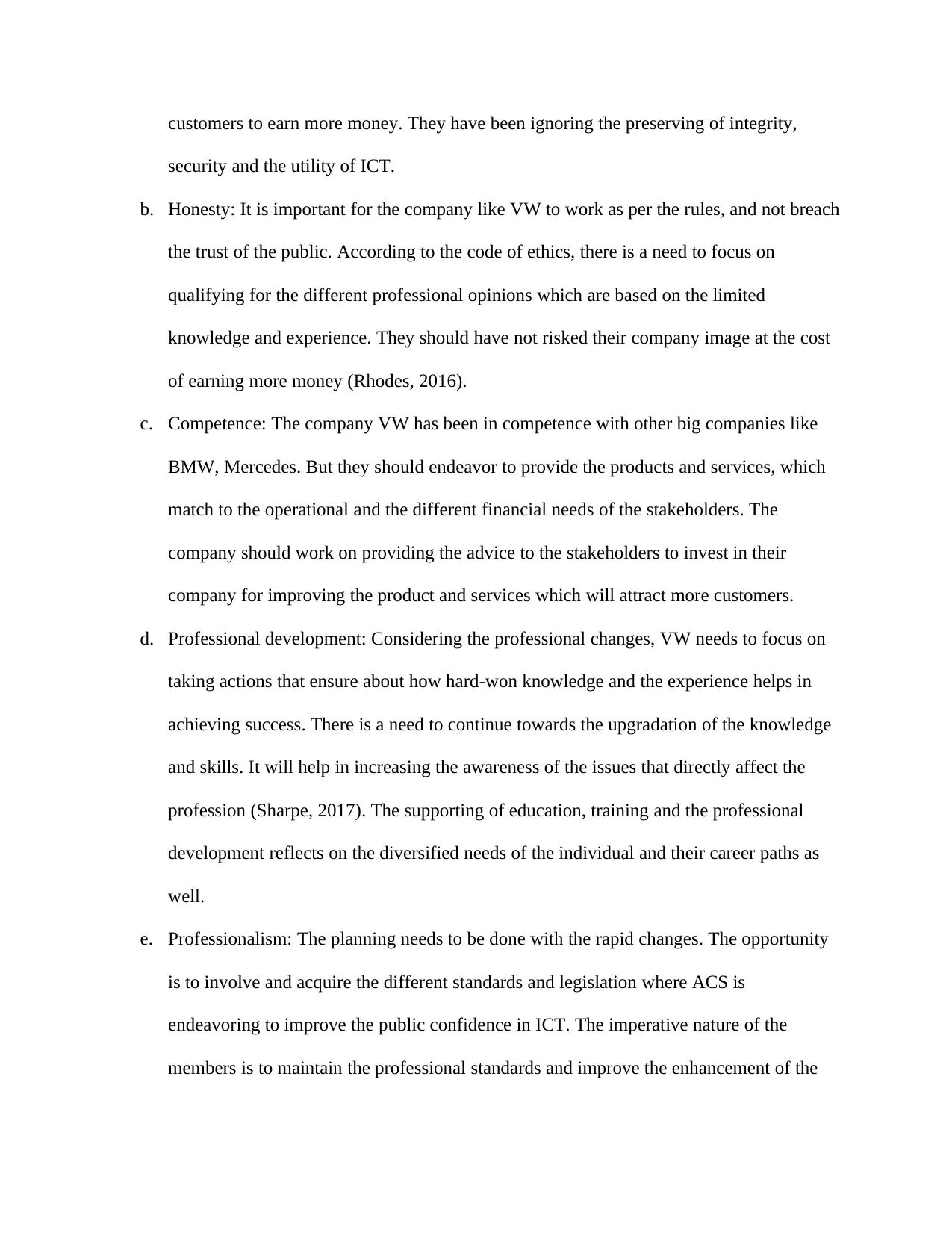
customers to earn more money. They have been ignoring the preserving of integrity,
security and the utility of ICT.
b. Honesty: It is important for the company like VW to work as per the rules, and not breach
the trust of the public. According to the code of ethics, there is a need to focus on
qualifying for the different professional opinions which are based on the limited
knowledge and experience. They should have not risked their company image at the cost
of earning more money (Rhodes, 2016).
c. Competence: The company VW has been in competence with other big companies like
BMW, Mercedes. But they should endeavor to provide the products and services, which
match to the operational and the different financial needs of the stakeholders. The
company should work on providing the advice to the stakeholders to invest in their
company for improving the product and services which will attract more customers.
d. Professional development: Considering the professional changes, VW needs to focus on
taking actions that ensure about how hard-won knowledge and the experience helps in
achieving success. There is a need to continue towards the upgradation of the knowledge
and skills. It will help in increasing the awareness of the issues that directly affect the
profession (Sharpe, 2017). The supporting of education, training and the professional
development reflects on the diversified needs of the individual and their career paths as
well.
e. Professionalism: The planning needs to be done with the rapid changes. The opportunity
is to involve and acquire the different standards and legislation where ACS is
endeavoring to improve the public confidence in ICT. The imperative nature of the
members is to maintain the professional standards and improve the enhancement of the
security and the utility of ICT.
b. Honesty: It is important for the company like VW to work as per the rules, and not breach
the trust of the public. According to the code of ethics, there is a need to focus on
qualifying for the different professional opinions which are based on the limited
knowledge and experience. They should have not risked their company image at the cost
of earning more money (Rhodes, 2016).
c. Competence: The company VW has been in competence with other big companies like
BMW, Mercedes. But they should endeavor to provide the products and services, which
match to the operational and the different financial needs of the stakeholders. The
company should work on providing the advice to the stakeholders to invest in their
company for improving the product and services which will attract more customers.
d. Professional development: Considering the professional changes, VW needs to focus on
taking actions that ensure about how hard-won knowledge and the experience helps in
achieving success. There is a need to continue towards the upgradation of the knowledge
and skills. It will help in increasing the awareness of the issues that directly affect the
profession (Sharpe, 2017). The supporting of education, training and the professional
development reflects on the diversified needs of the individual and their career paths as
well.
e. Professionalism: The planning needs to be done with the rapid changes. The opportunity
is to involve and acquire the different standards and legislation where ACS is
endeavoring to improve the public confidence in ICT. The imperative nature of the
members is to maintain the professional standards and improve the enhancement of the
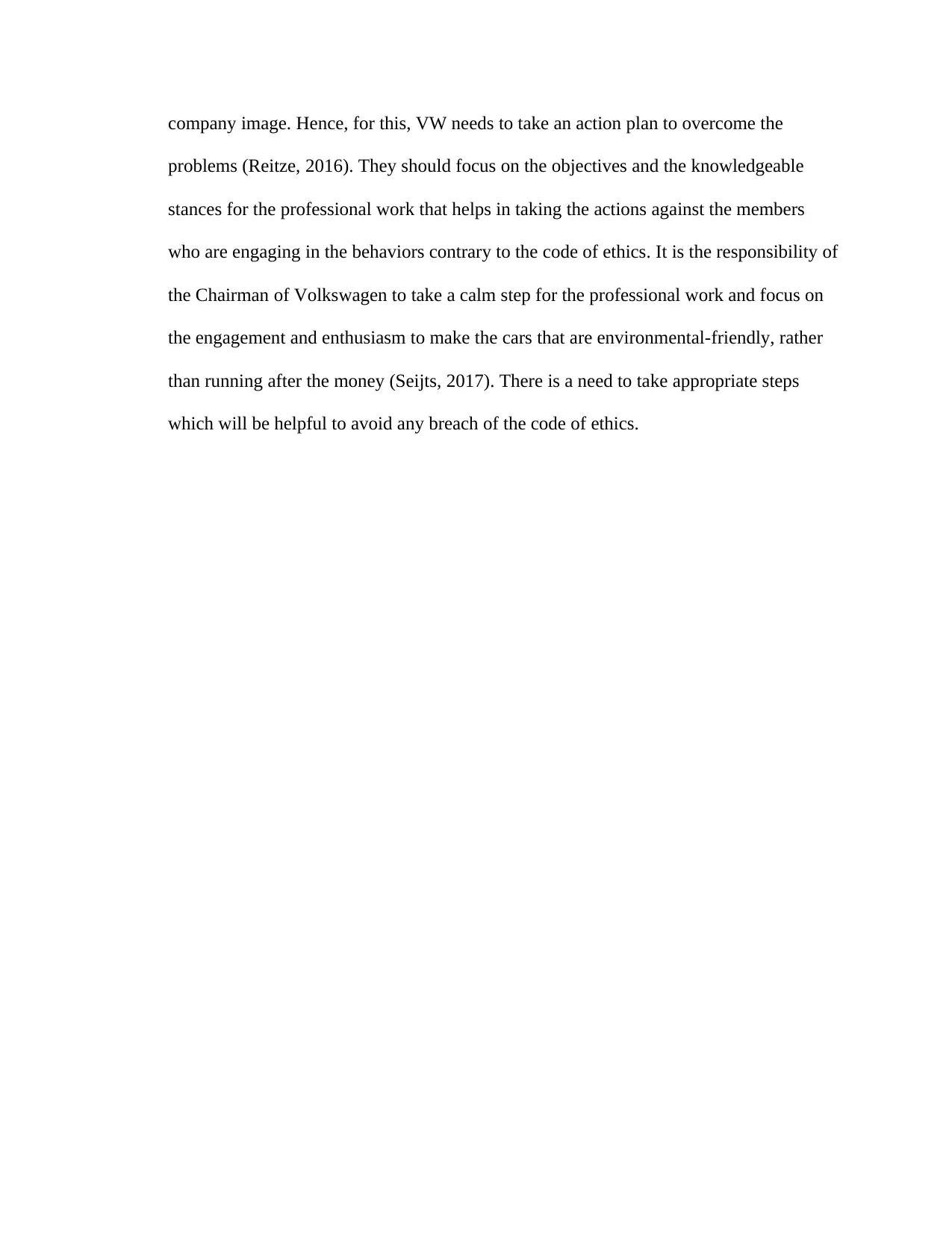
company image. Hence, for this, VW needs to take an action plan to overcome the
problems (Reitze, 2016). They should focus on the objectives and the knowledgeable
stances for the professional work that helps in taking the actions against the members
who are engaging in the behaviors contrary to the code of ethics. It is the responsibility of
the Chairman of Volkswagen to take a calm step for the professional work and focus on
the engagement and enthusiasm to make the cars that are environmental-friendly, rather
than running after the money (Seijts, 2017). There is a need to take appropriate steps
which will be helpful to avoid any breach of the code of ethics.
problems (Reitze, 2016). They should focus on the objectives and the knowledgeable
stances for the professional work that helps in taking the actions against the members
who are engaging in the behaviors contrary to the code of ethics. It is the responsibility of
the Chairman of Volkswagen to take a calm step for the professional work and focus on
the engagement and enthusiasm to make the cars that are environmental-friendly, rather
than running after the money (Seijts, 2017). There is a need to take appropriate steps
which will be helpful to avoid any breach of the code of ethics.
You're viewing a preview
Unlock full access by subscribing today!
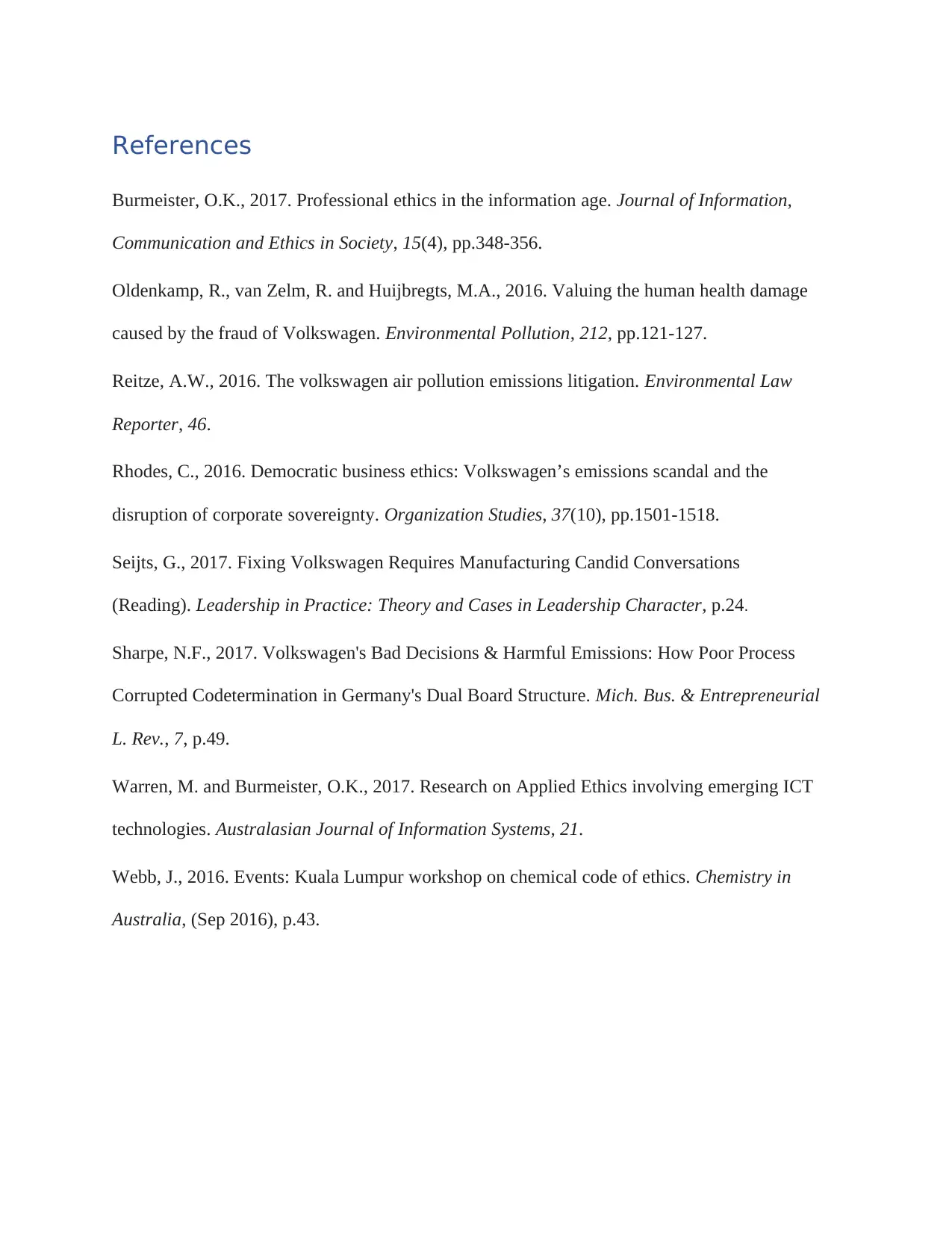
References
Burmeister, O.K., 2017. Professional ethics in the information age. Journal of Information,
Communication and Ethics in Society, 15(4), pp.348-356.
Oldenkamp, R., van Zelm, R. and Huijbregts, M.A., 2016. Valuing the human health damage
caused by the fraud of Volkswagen. Environmental Pollution, 212, pp.121-127.
Reitze, A.W., 2016. The volkswagen air pollution emissions litigation. Environmental Law
Reporter, 46.
Rhodes, C., 2016. Democratic business ethics: Volkswagen’s emissions scandal and the
disruption of corporate sovereignty. Organization Studies, 37(10), pp.1501-1518.
Seijts, G., 2017. Fixing Volkswagen Requires Manufacturing Candid Conversations
(Reading). Leadership in Practice: Theory and Cases in Leadership Character, p.24.
Sharpe, N.F., 2017. Volkswagen's Bad Decisions & Harmful Emissions: How Poor Process
Corrupted Codetermination in Germany's Dual Board Structure. Mich. Bus. & Entrepreneurial
L. Rev., 7, p.49.
Warren, M. and Burmeister, O.K., 2017. Research on Applied Ethics involving emerging ICT
technologies. Australasian Journal of Information Systems, 21.
Webb, J., 2016. Events: Kuala Lumpur workshop on chemical code of ethics. Chemistry in
Australia, (Sep 2016), p.43.
Burmeister, O.K., 2017. Professional ethics in the information age. Journal of Information,
Communication and Ethics in Society, 15(4), pp.348-356.
Oldenkamp, R., van Zelm, R. and Huijbregts, M.A., 2016. Valuing the human health damage
caused by the fraud of Volkswagen. Environmental Pollution, 212, pp.121-127.
Reitze, A.W., 2016. The volkswagen air pollution emissions litigation. Environmental Law
Reporter, 46.
Rhodes, C., 2016. Democratic business ethics: Volkswagen’s emissions scandal and the
disruption of corporate sovereignty. Organization Studies, 37(10), pp.1501-1518.
Seijts, G., 2017. Fixing Volkswagen Requires Manufacturing Candid Conversations
(Reading). Leadership in Practice: Theory and Cases in Leadership Character, p.24.
Sharpe, N.F., 2017. Volkswagen's Bad Decisions & Harmful Emissions: How Poor Process
Corrupted Codetermination in Germany's Dual Board Structure. Mich. Bus. & Entrepreneurial
L. Rev., 7, p.49.
Warren, M. and Burmeister, O.K., 2017. Research on Applied Ethics involving emerging ICT
technologies. Australasian Journal of Information Systems, 21.
Webb, J., 2016. Events: Kuala Lumpur workshop on chemical code of ethics. Chemistry in
Australia, (Sep 2016), p.43.
1 out of 7
Related Documents
Your All-in-One AI-Powered Toolkit for Academic Success.
+13062052269
info@desklib.com
Available 24*7 on WhatsApp / Email
![[object Object]](/_next/static/media/star-bottom.7253800d.svg)
Unlock your academic potential
© 2024 | Zucol Services PVT LTD | All rights reserved.


